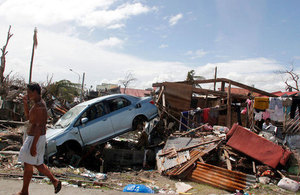UK pledges new focus on disaster preparation
Justine Greening to announce new programme which will help improve how developing countries prepare for humanitarian disasters, at the World Bank Spring meetings.

A man walks in front of some of the wreckage left by Typhoon Haiyan in Tacloban, the Philippines, November 2013. Picture: Russell Watkins/DFID.
The UK will lead a major improvement in the way developing countries prepare for humanitarian disasters to avert future crises, International Development Secretary Justine Greening will announce at the World Bank’s Spring Meeting in Washington.
The UK’s new Disasters and Emergencies Preparedness Programme will provide expert training, simulation drills and new disaster monitoring systems to ensure countries most at risk from natural disasters - such as Nepal, Bangladesh, Ethiopia or Sudan - can prepare for future shocks.
Ms. Greening will also call for greater global preparation and coordination of disaster responses, warning that the global humanitarian system is being pushed to its limits by crises such as the conflicts in Syria, Central African Republic and South Sudan or the recent devastation in the Philippines.
Speaking at the World Bank Spring Meetings, Justine Greening will say:
There is a growing danger that while some countries are graduating from aid, the most fragile and vulnerable countries will be left far behind.
The humanitarian system is already stretched to breaking point. The reality is that we are facing ever more demands on the system, as we deal with the effects of a changing climate, growing population, conflict and extremism.
Our global humanitarian system does great work but the scale of the challenge means all of us need to up our game. The global investment in emergency preparedness is extremely low. We urgently need larger, sustained investment in preparedness and resilience.
The UK’s new £40 million Disasters and Emergencies Preparedness Programme will award funding on a competitive basis to projects which will improve the quality and speed of humanitarian response. This will include:
- Expert training: New training programmes, disaster simulations and drills for aid workers in vulnerable countries.
Working with the START network – previously known as the Consortium of British Humanitarian Agencies – and the Communicating with Disaster-affected Communities Network, accredited international training programmes will be organised and run in the most at risk countries. This could include vulnerable developing countries such as Bangladesh, Democratic Republic of Congo, Haiti or South Sudan.
-
Improved early warning: support will be awarded to innovative new early warning systems which improve the communications and coordination of disasters. This could include extending satellite or geographic data monitoring to track disasters, national communication systems to warn vulnerable communities or more detailed risk analysis in disaster-prone regions.
-
In addition, DFID will set up a new £20 million fund for UNICEF and the World Food Programme to improve disaster planning in 11 high risk countries or regions – where 17 million people are at risk of a disaster, including 14 million women and children in emergencies. This will allow agencies to preposition relief items and replenish their stocks to so humanitarian responses can start as soon as a disaster hits. The countries will include Afghanistan, Burma, Nigeria, Pakistan, Philippines, Chad, Madagascar, Central America, Central Asia, African Great Lakes and the Syria region.
Studies show how effective this approach can be. For example, Bangladesh reduced casualties from 2 very comparable cyclones from 500,000 in 1972 to 3,400 in 2008.
Justine Greening will also set out DFID’s 5 key areas for improvement to help ease the demand on emergency assistance:
* Preparing for disasters:
Greater investment in preparedness and resilience is needed so communities at risk of disaster can better withstand and quickly recover from shocks.
Less than 5% of all humanitarian funding in 2009 was spent on emergency preparation – or less than 1% of foreign aid. A recent analysis by the Overseas Development Institute revealed that 12 low-income countries received £160,000 humanitarian disaster aid for every £1 invested in reducing the risk of disasters.
* Supporting national and local leadership:
More support for local civil society organisations is needed so that they can lead humanitarian responses locally and help reduce the burden on the UN.
* Recipients driving aid:
The people in need of assistance are best placed to say what they need. Responses need to be better tailored to emergencies so the specific needs of those affected are met.
* A 21st century response:
New and innovative approaches to humanitarian assistance are needed including using mobile phones, making use of advancements such as more flexible shelter kits and distributing cash instead of traditional relief supplies so people can make choices on what they urgently need.
* The development challenge:
Humanitarian disasters are increasingly in the places where extreme poverty is focused. Long-term planning is needed to help prevent or minimise the impact in areas that are vulnerable to regular or protracted crises such as food shortages.
General media queries (24 hours)
Email mediateam@dfid.gov.uk
Telephone 020 7023 0600
If you have an urgent media query, please email the DFID Media Team on mediateam@dfid.gov.uk in the first instance and we will respond as soon as possible.